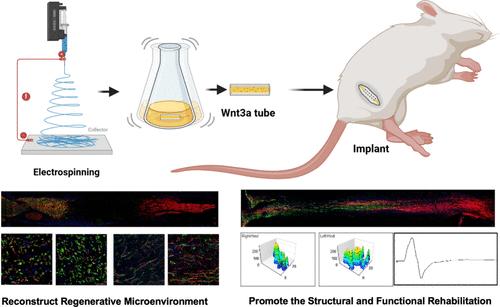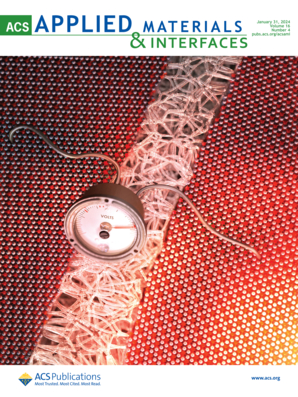Wnt 3a-Modified Scaffolds Improve Nerve Regeneration by Boosting Schwann Cell Function
IF 8.2
2区 材料科学
Q1 MATERIALS SCIENCE, MULTIDISCIPLINARY
引用次数: 0
Abstract
A pivotal approach in engineering artificial peripheral nerve sheaths encompasses the augmentation of the regenerative microenvironment via the manipulation of Schwann cells (SCs). Our investigation employed single-cell sequencing analysis to elucidate the potential functions of Schwann cells and the Wnt pathway in facilitating peripheral nerve regeneration. In vitro studies showed that activating the Wnt signaling pathway promotes the transition to repair SCs, boosting their growth, movement, and immune functions. To better understand the peripheral nerve regeneration environment, we created a polymer scaffold using ammonization and electrospinning. The Wnt3a protein was incorporated into the polycaprolactone (PCL) electrospun fiber surface. In a rat sciatic nerve defect model, the Wnt3a-modified scaffold showed better nerve repair outcomes than traditional electrospun scaffolds. After a week, the test group showed better immune regulation and angiogenesis, with a significant increase in axon growth rate observed after 3 weeks. Three-month-long animal experiments revealed notable improvements in neuroelectrophysiology, reduced organ atrophy, and enhanced sciatic nerve recovery. In this nerve defect model, Wnt3a-modified neural scaffolds achieved repair effects.

Wnt 3a 改性支架通过增强许旺细胞功能改善神经再生
人工外周神经鞘工程的一个关键方法是通过操纵许旺细胞(SCs)来增强再生微环境。我们的研究采用单细胞测序分析来阐明许旺细胞和Wnt通路在促进周围神经再生中的潜在功能。体外研究表明,激活Wnt信号通路可促进许旺细胞向修复过渡,促进其生长、运动和免疫功能。为了更好地了解周围神经再生环境,我们利用氨化和电纺丝技术制作了一种聚合物支架。在聚己内酯(PCL)电纺纤维表面加入了 Wnt3a 蛋白。在大鼠坐骨神经缺损模型中,Wnt3a修饰的支架比传统的电纺支架显示出更好的神经修复效果。一周后,试验组显示出更好的免疫调节能力和血管生成能力,三周后观察到轴突生长率显著增加。长达三个月的动物实验显示,神经电生理明显改善,器官萎缩减少,坐骨神经恢复能力增强。在这种神经缺损模型中,Wnt3a修饰的神经支架达到了修复效果。
本文章由计算机程序翻译,如有差异,请以英文原文为准。
求助全文
约1分钟内获得全文
求助全文
来源期刊

ACS Applied Materials & Interfaces
工程技术-材料科学:综合
CiteScore
16.00
自引率
6.30%
发文量
4978
审稿时长
1.8 months
期刊介绍:
ACS Applied Materials & Interfaces is a leading interdisciplinary journal that brings together chemists, engineers, physicists, and biologists to explore the development and utilization of newly-discovered materials and interfacial processes for specific applications. Our journal has experienced remarkable growth since its establishment in 2009, both in terms of the number of articles published and the impact of the research showcased. We are proud to foster a truly global community, with the majority of published articles originating from outside the United States, reflecting the rapid growth of applied research worldwide.
文献相关原料
公司名称
产品信息
阿拉丁
BSA
阿拉丁
glutaraldehyde
阿拉丁
hexafluoroisopropanol
 求助内容:
求助内容: 应助结果提醒方式:
应助结果提醒方式:


